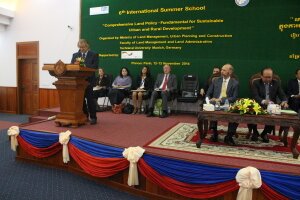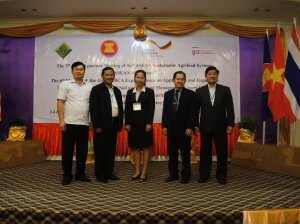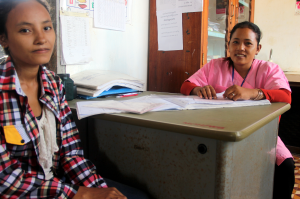Development between Production and Protection: International Summer School Addresses Land Policy Issues
PHNOM PENH - The 6th International Summer School, Comprehensive Land Policy – Fundamental for Sustainable Urban and Rural Development was held by the Ministry of Land Management, Urban Planning and Construction (MLMUPC), jointly organized with the Royal University of Agriculture (RUA), and the Technical University Munich (TUM), in partnership with GIZ.
The summer school reached an unprecedented scale, attracting about 360 participants with representatives from Bangladesh, Cambodia, China, Germany, Lao PDR, Nepal, the Philippines, Serbia, Thailand and Vietnam. Aiming for balanced perspectives, speakers included local and international NGOs, Cambodian and German academe, government representatives of Cambodia and the region, and bilateral and multilateral development organisations.
After a well-received welcome speech by the German Ambassador to Cambodia, H.E. Baron Marschall von Bieberstein on the land reform, senior minister H.E. Im Chhun Lim, opened the summer school, pointing out, among many other aspects, the comprehensive character of the national land policy.
The summer school was structured into different themes:
- Relevance of Land Policy in the Global and International Context: Addressed inputs on sustainable development goals (SDGs), Global Land Indicator Initiative, Voluntary Guidelines on the Responsible Governance of Tenure (VGGT) and on land policy efforts in other countries in the region. While land policy has to address the needs of all, marginalized or vulnerable groups require explicit and targeted consideration.
- Land Policy and Marginalized Groups: Discussed housing rights of the urban poor, indigenous land rights as well as gender-sensitive land policy, with inputs of representatives from UN Women, the Cambodia Indigenous Youth Association (CIYA), the Asian Coalition for Housing Rights (ACHR) and government.
- Cross-Cutting Topics of Land Policy: Presented concepts of ecosystem services and impacts of economic corridor development. Different perspectives on the Cambodian White Paper on Land Policy and its implementation complemented the themes addressed.
H.E. Dr. Holger Magel summarized key messages from the summer school in his closing speech, including an acknowledgment of the comprehensiveness of the White Paper on Land Policy, its quality in an international context and the political signals of commitment to its objectives. Likewise, he emphasized the need to focus on implementation and its review and evaluation, on participation, information, capacity development and cooperation – all key means for achieving an implementation that lives up to the spirit of the policy: a sustainable rural-urban development between production and protection.
For further information, all presentations is available: http://giz-cambodia.com/6th International Summer School 2014
![]()
The 5th Project Partner Meeting of the:
“ASEAN Sustainable Agrifood Systems The 6th Meeting of the ASEAN BCA Expert Groups on Application and Regulation The 1st Meeting of the ASEAN Soil and Nutrient Management Expert Group The Dialogue on ASEAN Integrated Food Security (AIFS) Framework”
02 – 04 December 2014
PRESS RELEASE
Nay Pyi Taw, 02 December 2014: The Association of Southeast Asian Nations (ASEAN), the German International Cooperation (GIZ) together with the Department of Agriculture of Myanmar’s Ministry of Agriculture and Irrigation organized the 5th Project Partner Meeting of the “ASEAN Sustainable Agrifood Systems” and related meetings on 2-4 December 2004 at Shwe Pyi Taw Hotel, Nay Pyi Taw, Myanmar.
H.E. U Ohn Than, Deputy Minister, Ministry of Agriculture and Irrigation presided over and opened the Meeting.
The agrifood sector is of critical importance in Southeast Asia and beyond. The demand for food products of higher quality and quantity to supply both domestic and international markets, along with the need to manage scarce natural resources, has driven agricultural development policies towards the concept of “sustainable agrifood systems”.
Sustainable Agrifood Systems’ project, an ASEAN – German cooperation to develop regionally coordinated policies and strategies for sustainable agrifood systems is one of the two modules under the ASEAN-German Programme on Response to Climate Change: Agriculture, Forestry and Related Sectors (GAP-CC) commissioned by the German Federal Ministry for Economic Cooperation and Development (BMZ) from 2011 to 2017. Towards realization of ASEAN Community by 2015 and beyond and in the light of the planned ASEAN Economic Community (AEC), the Project also promotes sustainable cross-border value chains jointly with public decision-makers, agricultural enterprises as well as farmers’ and private associations. Furthermore, farmers are supported with the implementation of sustainable production technologies and practices.
The Project builds upon experiences gained during the first phase (ASEAN Biocontrol, 2011-2013) and broadens its scope by expanding the focus on biological control agents (BCA) to soil and nutrient management and farm economics. To ensure long-term food security in ASEAN, the Project supports the Member States to implement the ASEAN Integrated Food Security (AIFS) Framework and its Strategic Plan of Action on Food Security in the ASEAN Region (SPA-FS) at national level.
Three prioritised crop sectors will be implemented by ASEAN Member States, namely rice, fruits and vegetables. The topics where areas of intervention are applied include: Integrated Pest Management and Biological Control, Integrated Soil and Nutrient Management, and Farm Economics.
The Project is important for the Government authorities, private sector, farmers as well as consumers in ASEAN Member States (AMS). The activities of the project will be implemented both at the regional and national levels to meet its objectives. Considering the importance of the Project, the 5th Project Partner Meeting and related meetings are very important as it will discuss and agreed on project activities implementation during 2015-2017.
In addition, H.E. U Ohn Than, Deputy Minister, Ministry of Agriculture and Irrigation has launched and handed over of the translation of the ASEAN Integrated Food Security (AIFS) Framework and the ASEAN Guidelines on the Regulation, Use and Trade of Biological Control Agent (BCA) for further implementation by the ASEAN Member States at the national level.
The Khmer translation of the ASEAN policies was received by a Cambodian Delegation coming from the Department of Agricultural Legislation and General Directorate of Agriculture under the Ministriy of Agriculture, Forestry and Fishery.
Contact Information
The Project primarily works at a regional level and has established six offices in the ASEAN region (Cambodia, Indonesia Lao PDR, Myanmar, Thailand and Vietnam)
ASEAN Sustainable Agrifood Systems (SAS)
Project Office – Cambodia
#80c, North Bridge Street, Khan Sen Sok
Phnom Penh
www.asean-agrifood.org
Mr. Claudius Bredehöft, National Project Coordinator
E-mail: [email protected]
![]()




